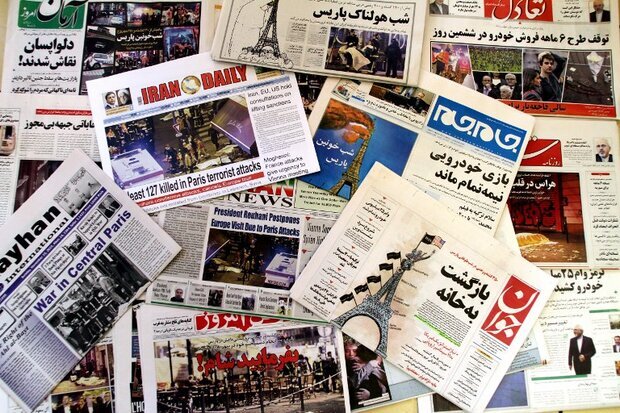Ukrainian war shows there is no global hegemonic power

The Etela'at writes: The war in Ukraine is undoubtedly the tensest conflict of the contemporary world.
Main global actors, the U.S., Russia, international organizations, European countries, and the "Global South" are involved in it.
But the United States cannot ignore the fact that a group of effective international actors, that is, the Global South, while maintaining a friendship with Washington, are not ready to take side with the United States against Russia. Their views on the war in Ukraine are different from the views of Russia and the U.S.
This in turn shows two serious facts. First, these players who are from the Global South have the will and authority to choose their own way. They are not forced to join a bloc like during the Cold War. And the second fact is that the U.S. and Russia have not been able to detach them from their independent and different position.
This is an important phenomenon and shows the fact that no country has global hegemony in the world.
Etemad: Hopeful tone of IAEA chief in Vienna
Writing in the Etemad newspaper about the IAEA chief’s visit to Tehran, political analyst Hassan Beheshtipour says: If the joint statement of Iran and the IAEA, which was published in three clauses, is the result of Rafael Grossi's trip to Tehran, then we can have a better assessment of the achievements of this trip.
As stated in this statement, Iran is not going to give many accesses to the IAEA's inspectors. The Islamic Republic is willing to give some access to the inspectors in the framework of Safeguards Agreement to resolve the remaining questions of the IAEA about three suspect sites.
Iran had already answered the IAEA's questions, but the body has said that it was not convinced. Now, Iran has promised to provide access to the IAEA to deal with these questions in the framework of IAEA safeguards.
It seems that Iran tried to satisfy Grossi as much as possible to prevent a resolution against Iran based on his report.
When you look at the speech of the director general of the International Atomic Energy Agency in Vienna on Saturday night, you will realize that he wanted to move things forward, not issue a new resolution against Iran.
IRAN: Preparing grounds for the West to return to negotiations
The two-day visit to Tehran by Raphael Grossi, Director General of the Atomic Energy Agency, came to end on Saturday, March 4th, and he returned to Vienna, IRAN writes.
The director general announced at Vienna airport that the inspection of the Fordow site will increase by 50%. He also claimed that monitoring cameras will be installed again in some places. While rejecting the 84% enrichment in Iran, Grossi also called the agreement for "access to people" as an important step in the negotiations.
Grossi's words can be seen as a face-saving return of the West and the U.S. to the negotiation table.
During the unrest in Iran, the United States repeatedly announced that nuclear negotiations are no longer on its agenda. But the failure of the project of chaos and anarchy in Iran has caused them to slowly change their approach and prepare grounds for the start of negotiations by sending frequent messages.
Arman-e-Melli: Iran, IAEA agree to resolve disputes
Arman-e-Melli writes: Grossi's statements after his trip to Vienna are such that one can have a positive impression about the resolution of the nuclear disputes between Iran and the IAEA.
With the start of the Ukraine war, Iran's nuclear issue was tied to the alleged sending of drones by Iran to Russia and the atmosphere surrounding the Iran nuclear talks entered a new phase.
On the other hand, unrest took place in Iran and the Europeans imposed sanctions against Iran under the pretext of protecting human rights.
Accordingly, Europe and the U.S. started to create a smearing campaign against Iran in the international arena. Therefore, Tehran finally came to the conclusion to enter into negotiations with the IAEA and fulfill safeguards so that the Westerners do not take a step towards sending the Iran case to the Security Council.
Now, during Grossi's visit to Tehran, some safeguard issues have been put on the agenda and should be resolved, and it can be inferred from Mr. Grossi's tone that an agreement between Iran and the IAEA would be reached to resolve nuclear case.
Javan: Is the U.S. building a bridge to negotiations?
Grossi's words after leaving Tehran are a positive reaction to his agreement with Tehran, Javan writes.
The agreement between Iran and the IAEA was made three days after Robert Malley, the U.S. special representative for Iran affairs, said let's see what the IAEA reports back and then there will be time for us to decide on appropriate next steps.
It is not clear whether Iran's agreement with the IAEA will lead to the resumption of the JCPOA negotiations, but it is possible to imagine that the Biden government may once again want to test the chance for a deal with Iran in view of the positive report by Grossi.
Earlier, the Wall Street Journal reported that Britain, France, and Germany are more critical of Tehran than the U.S. Now we have to see if Washington will be able to build a bridge to revive the JCPOA from the results of Grossi's trip to Tehran!
Leave a Comment